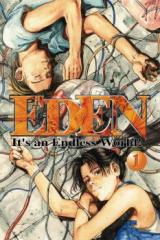And found that there were some valid points made by all parties. I can probably get away with posting a wall of text about it since so many other people have done so.
The pacing and narration remind me strongly of 20CB. Often there will be a switch to a new location & new characters to reveal more intrigues / aspects of the plotline. For the most part these plotlines either converge after a short time or don't at all. This story is nowhere near shounen, it's clearly an action / drama that's heavy on plotline and themes of morality.
Much of the story deals in conflicts of the type which involve conspiracy, hackers, set-ups, snipers, explosions. That's why it's action. But it's also plot-based. The plot is science fiction in the sense of technology but equally in the sense of "political science". And the sci-fi is far from a distortion of scientific principles. The author understands what he talks about. The Propatria is no evil empire, by the way. They practice diplomacy, and are influenced/subject to the media and public opinion opinion.
The author's style also changes over time slightly but noticeably. There're a lot of moral and social rhetoric early on (it's not random intellectualism as Chas decided, btw), but then it starts to focus more on plot & character development with rhetoric usually thrown in only at crucial times when it's appropriate. There are also a lot more plotlines going on at once by volume 13, in earlier volumes there was often only 1 plot/perspective at a time.
The first several volumes are from the perspective of Elia as a sensitive kid who comes to experience some harsh realities, but focus a lot more deeply on the people who meets than he himself. Volumes 5-8 finally demonstrate the depth of his character and start to truly develop it (masterfully). Around volume 8/9 the author also starts to show a sense of humor (a "cute" side) to the story. And starting from volume 9 the author starts to incorporate a lot more complexity into the story, with new characters and plots.
We have multi-chapter flashbacks. Often entire story arcs have no apparent relevance to the main plots of the series except to develop characters and offer a look into the lives people live (like volume 9). If you pay attention you can quickly tell when a flashback is a flashback, otherwise you should assume a sudden shift in location/characters just means that the story's timeline is progressing uninterrupted elsewhere and not let the context bother you.
So what I like: the depth of storyline, the attention to detail, the unique characters and style of character development, the author's tendency to not pull punches. What I don't like: the sudden decision on the part of the author to add a "cute" side to the story ~volume 8/9, the plot which often becomes so complex I can't follow the details or remember names that all sound South American, the learning curve required to understand exactly how all these plotlines fit together and realize what is and isn't related to the central plots of the series and realize that volumes 6-8 really /don't/ have any relevance to those plots except character development, and as Chas mentioned the very fragmented plot which leaves so many questions unanswered it can become difficult to make sense of.
Let me comment on Chas's controversial post, by the way.
That the action is bad is just false. It's very cleverly orchestrated and suspensefully set up. The one exception to this is Kenji (the Jesus of knives), who is most likely the object of the term "storm trooper effect", but Kenji's part is less than 20% of that whole story arc. The enemies were never as easy as mindless drones, and the "invincible anti-heroes" were far from it. I can't reveal details but if you read the fight Chas is referring to in volumes 2-4 you'd see how incorrect he is.
That the story takes an obvious moral stance is also totally incorrect. Much of the story, in fact, has consisted of bringing up moral conflicts without really resolving them. A major theme of the story as I interpret it is inability to protect those you love without committing acts of sin (the idea of sin is very present as well). Even if the "obvious moral stance" is the declaration of that as a fundamental conflict, doesn't that fundamental conflict give rise to enough moral difficulty by itself?





